Hospitals are asking patients and visitors to wear face masks again amid Covid’s resurgence.
Cases have soared to a five-month high in Britain, figures suggest.
But virologists expect cases to only spike further throughout the autumn and winter as the highly-transmissible Pirola variant continues to spread.
Although nowhere near the same threat it was two years ago, outbreaks can cause chaos in workplaces, hospitals and classrooms.
Gatwick Airport last week had to scrap dozens of flights due to staff illness, while a secondary school in Rutland reverted to virtual lessons for pupils after a cluster of teachers were sickened.
Worcestershire Acute Hospitals NHS trust has now brought back mask guidance, in scenes reminiscent of the darkest days of the pandemic.
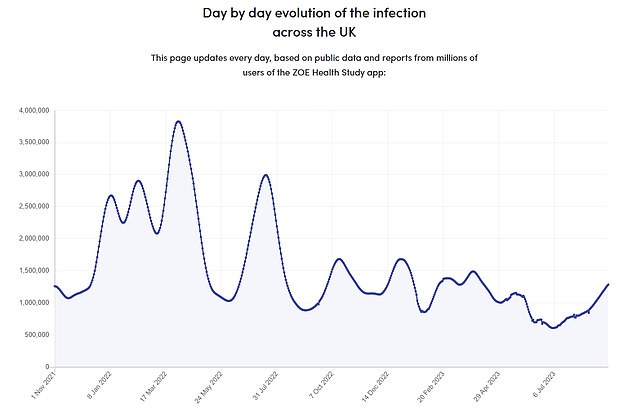
Around 1.2million Brits were infected with the virus in the week to September 10, according to data from the ZOE Covid study, based on reports from thousands. The figure is the highest logged since early April, when the super transmissible Arcturus was sweeping the UK
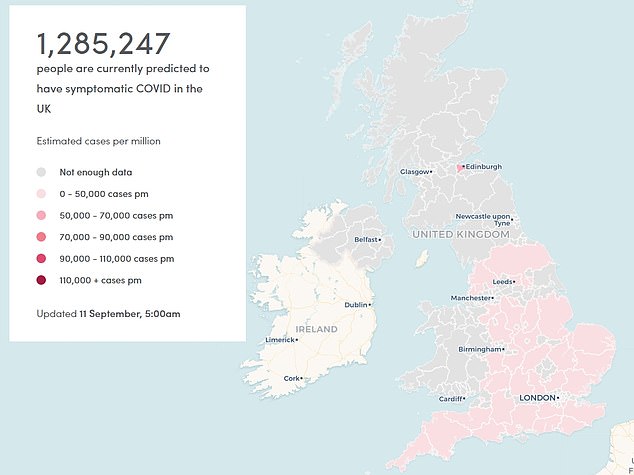
Around 1.2million Brits were infected with the virus in the week to September 10, according to data from the ZOE Covid study
Bosses at the organisation, which runs three hospitals, said they have seen an uptick in the number of Covid-infected patients.
Covid absences among staff are also on the rise, the trust said.
A statement issuing the update said: ‘We want to do everything we can to protect the people we care for from the risk of infection.
‘We are grateful for the support and understanding of our patients and visitors.’
Masks were a major part of Britain’s early lockdowns, with them made mandatory in shops, supermarkets, public transport and hospitals.
But officials binned all remaining laws requiring them in places like schools in early 2022, as part of it’s ‘living with Covid’ strategy.
Since then, some hospitals and other clinical settings have issue their own health messaging and advice to encourage masks when cases are on the rise.
Worcestershire Acute Hospitals NHS Trust will be handing out masks on arrival at its sites.
Meanwhile, mask policies have been tightened at both the Royal Stoke University Hospital and Stafford’s County Hospital. Patients are staff are being urged to wear coverings again.
Matthew Lewis, medical director at University Hospitals of North Midlands NHS Trust, which oversees both hospitals, said: ‘Multiple variants of Covid continue to circulate in the population during all seasons.’
He added: ‘This is a situation which is constantly under review and as a result we have re-introduced the wearing of surgical masks in some of our hospital areas.’
Data from ZOE’s Covid-tracking suggests that 1.2million Brits were infected with the virus in the week to September 10.
The figure — based on self-reported test results — is the highest logged since early April, when the super transmissible Arcturus was sweeping the UK.
While marking a five-month high, it is still a fraction of the 3.8m estimated to have been infected when the virus peaked in spring 2022.
It estimated that there were 97,904 new cases of symptomatic Covid on September 30, with rates highest in Scotland (between 1,408 and 2,305 per million people).
The prevalence of Covid was also high in the South West (1,275, to 1,911 per million), Yorkshire and the Humber (1,111 to 1,972 per million) and the South East (1,104 to 1,566 per million).
However, hospitalisations in the UK flattened out in the week to September 24, according to latest figures from the UK Health Security Agency (UKHSA).
Some 4.36 people per 100,000 were hospitalised with Covid, down from 4.56 per 100,000 one week earlier.
Admission rates remained stable among under-fours and those aged 15 to 44, while they have decreased among all other age groups.
The figures suggest, despite the rise in cases, that the virus remains mild for the vast majority.
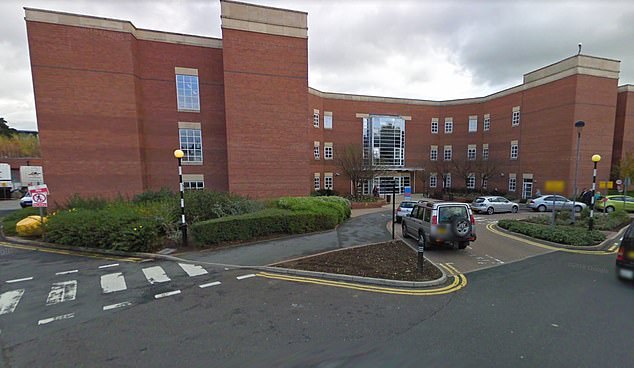
Worcestershire Acute Hospitals NHS trust has now brought back mask guidance, in scenes reminiscent of the darkest days of the pandemic. Pictured: Worcestershire Royal Hospitals
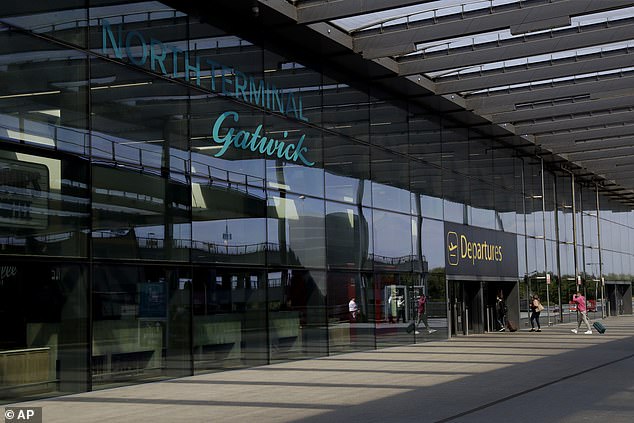
Gatwick Airport (pictured) last week had to scrap dozens of flights due to staff illness, while a secondary school in Rutland reverted to virtual lessons for pupils after a cluster of teachers were sickened
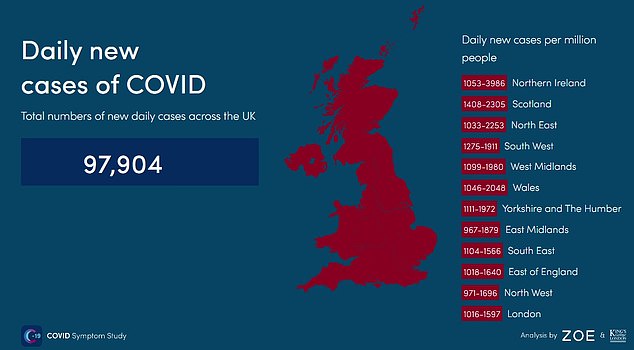
The ZOE Covid data is based on virus test results and self-reported data from thousands using the app. It estimated that there were 97,904 new cases of symptomatic Covid on September 30, with rates highest in Scotland (between 1,408 and 2,305 per million people). The prevalence of Covid was also high in the South West (1,275, to 1,911 per million), Yorkshire and the Humber (1,111 to 1,972 per million) and the South East (1,104 to 1,566 per million)
Health chiefs also noted that one in three cases were detected among patients in hospital for another ailment, but who were tested on admission.
Dr Jamie Lopez Bernal, consultant epidemiologist for immunisation at the UKHSA, said ‘multiple indicators’ suggest the virus has stabilised, which is ‘good news’.
However, health chiefs will ‘remain vigilant and monitor rates closely’, he said.
The NHS last month launched its autumn Covid and flu booster jab rollout, which was brought forward by a month after officials were spooked by the Pirola variant.
The Omicron spin-off, scientifically known as BA.2.86, has more than 30 mutations that experts fear allow it to spread easier.
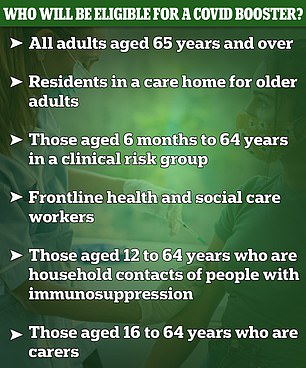
In a bid to ‘go back to normal’, invites won’t be dished out to millions aged 50-64 who were eligible during the pandemic
People started getting their jabs from September 11 rather than in October as previously planned. The UKHSA said the move would lead to greater protection against illness, particularly for the most vulnerable, as well as reducing the impact on the NHS.
However, in an update last month, the UKHSA said it may pose no more reason for concern than the swathe of other Covid variants that are spreading.
‘Encouraging’ lab tests show immunity offered by jabs and previous infection are likely to still protect against the heavily mutated strain.
And health chiefs said there is so far ‘no evidence’ that the variant is more likely to trigger serious illness than other Omicron spin-off strains.
However, Dr Bernal urged those eligible to roll up their sleeves to boost their protection and reduce the risk of passing the virus on to vulnerable Brits.
The over-65s, at-risk groups, care home residents and NHS staff are among those who can get a top-up dose.
‘Vaccination continues to provide the best protection against serious illness and hospitalisation from Covid,’ he added.
However, while Covid appears to be flattening off, the virus circulating in high levels has caused chaos in workplaces.
The spike in Covid cases is also saw Gatwick cancel 82 flights in the last week — around three per cent of those scheduled — due to three in 10 air control staff being off sick, in part due to Covid.
It has forced passengers to fork out hundreds of pounds for alternative transport and hotels.
Dr Simon Clarke, a microbiologist at the University of Reading, told MailOnline: ‘As we move towards the winter we can expect to see increased numbers of Covid infections.
‘But people should be aware that we’re still learning about this virus and as yet it doesn’t seem to be behaving exactly in the way we’d expect of a classic seasonal respiratory infection. There is still an awful lot to learn.’
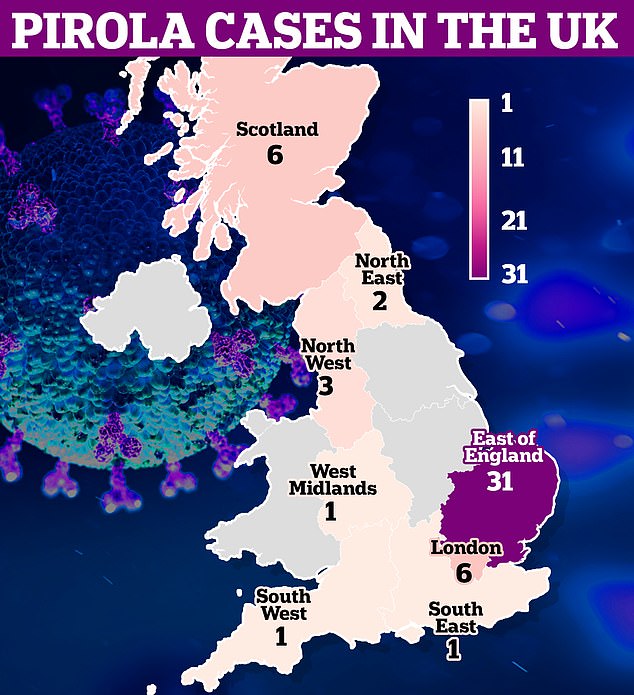
The UK’s total cases Pirola cases stood at 54 as of September 18
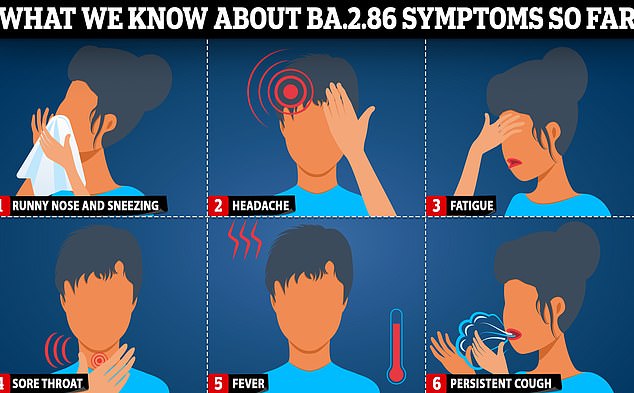
While virologists have warned it is too early to reliably pinpoint BA.2.86 specific symptoms, its ancestor BA.2 had some tell-tale signs. Experts aren’t yet certain, however if it behaves like similar Omicron subvariants, the signs to watch out for include a runny nose, sore throat and fatigue
He added: ‘We can expect case numbers of all respiratory viruses to climb as we hit the winter and it will likely [be] any sector that involve a high level of person-person contact that are hit the hardest by staff absences.
‘Their very nature means that staff are most likely to come into contact with someone who’s already infected, and staff are less likely to be able to transfer to working from home.’
Professor Paul Hunter, an infectious disease specialist at the University of East Anglia, told MailOnline: ‘If SARS-CoV-2 follows the pattern of the other human coronaviruses then I suspect we will see infections peaking sometime December to February.
‘But Covid is still taking up far fewer beds than we saw earlier this year. I don’t know how high this will go but I doubt it will get close to the levels we saw last winter.’
It comes as health chiefs confirmed details of a Covid infection survey, which will be launched this winter to accurate monitor Covid cases.
The gold-standard Office for National Statistics (ONS) survey ran for nearly three years but was scrapped in March 2023 as part of the UK’s move towards learning to live with Covid.
The new study will run from November 2023 to March 2024 and will involve up to 32,000 lateral flow tests being carried out each week.
Up to 200,000 members of the public will be invited to take part – a smaller number than in the original survey, but the results will be broadly representative of the population as a whole.
The study is being co-ordinated by the ONS and the UKHSA, which oversaw the original survey together with Oxford University.
Professor Steven Riley, UKHSA director-general of data, analytics and surveillance, said: ‘The data we collected alongside the ONS during the pandemic provided us with a huge amount of valuable insight.
‘So I am delighted that we are able to work together again to keep policymakers and the wider public informed in the coming months.
‘UKHSA continues to lead the way internationally on Covid surveillance and by re-introducing a study of positivity in the community, we can better detect changes in the behaviour of the virus.’
ONS deputy national statistician Emma Rourke said ‘robust data’ is needed to help understand the virus and its effects during winter, adding: ‘The ONS is committed to building on the experience of standing up the gold standard infection survey.
‘As well as working to provide UKHSA with regular rates of positivity, we will also be looking at analysis of symptoms, risk factors and the impact of respiratory infections, including long Covid, as part of this important surveillance.’










